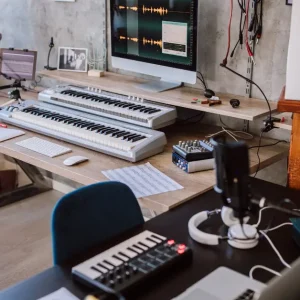Did you know that research has showed that only 4 percent of people are tone deaf, meaning they cannot listen to a note and sing the same note back? This means that for the other 96 percent of us, singing is a skill we can learn. But can everyone sing, or does singing skill come down mostly to natural talent?
Trying to figure out if you’re a talented singer can be tricky. Read on to learn how to assess your singing abilities and how you can improve your skills if you want to become a better singer.
Can Everyone Sing?
Most of us have, at some point, asked ourselves the question, “Can anyone sing or is it a gift?” Listening to a talented singer can be inspiring, but it can also be a little intimidating if you aren’t sure how talented you really are. You may wonder to yourself, “Can anyone learn to sing high notes?” or start to question if you’ll ever be able to hit those rockstar dreams.
The truth is that, while there is some natural talent involved in excellent singing, almost anyone can learn to sing well. Quality singing is a matter of learning how to match pitch well, transition between notes, read music, and use proper singing technique. The voice is an instrument like any other, and you can learn to use it well with time and discipline.
Record Yourself
One of the simplest ways to start assessing your singing abilities is by recording yourself singing. It can feel uncomfortable to listen to your own voice, but this is one of the clearest ways to get an honest view of your abilities. The way your voice resonates in your skull changes how you sound in your own head, so listening to yourself sing in the shower isn’t an accurate assessment.
Pick a song you know well and that you feel comfortable singing for your recording test. If possible, you don’t want to use a song that pushes too close to the high or low ends of your vocal range. Record yourself singing this song and play it back to see how you sound to other people’s ears.
Ask Trusted Friends
Recording yourself is an excellent place to start, but the truth is most of us are going to be biased about our abilities in one way or another. If you already believe you’re an excellent singer, you may be inclined to overlook some vocal flaws. If you’re doubtful about your abilities, you might nitpick yourself to death.
To get a more objective view of your abilities, ask a trusted friend or family member for their opinion. Sit down with them and sing the same song you chose to record for your self-assessment. Ask them for their honest opinion about whether you’re a good singer and why they feel the way they do.
Test Your Tone Sensitivity
After your overall assessments, there are some more specific tests you can do to test your singing skills. Testing your tone sensitivity is a good way to start getting an objective handle on your skills, rather than a subjective viewpoint. Tone sensitivity is effectively how well you can match pitch, which is critical for good singing.
If you have access to a piano, play a note and try to sing the same note you hear. This is another instance where recording yourself can be helpful to get a better idea of how closely you’re actually matching pitch. You can also play some simple melodies and then sing them back to see how well you can follow strings of notes.
Check Your Vocal Range
In addition to testing your tone sensitivity, checking your vocal range can give you an idea of your natural talent. Before you start this test, you may want to spend five to ten minutes singing. Your vocal cords need to be warmed up like any other muscle in your body before they’re ready to perform at peak capacity.
Once you’ve warmed up your voice, pick a note on the piano and sing it. Then play the next note down and the next note down and so on, matching pitch until you reach the lowest note you can comfortably sing. Repeat this process going up the scale until you reach the highest note you can comfortably sing – these two notes represent your range.
Evaluate Your Technique
The final test you can do on your own to evaluate your singing is to take a look at your technique. Much like proper technique can help you to draw a still life better or throw a ball more accurately, proper technique can help you to sing better. You’ll be able to produce a clearer, purer sound, and you won’t get tired as quickly.
Start with your stance – you should be standing up with your feet shoulder-width apart with your hips, shoulders, and neck all in one straight line. Your shoulders should be back and down, your chin should be up, and your jaw should be relaxed. You should be taking deep belly breaths in and using your diaphragm to push the sound out as you sing.
So, Can Everyone Sing?
Although everyone can sing, some people are more skilled than others. The good news is that if you want to be a better singer, you can always work to improve those skills. Start by recording yourself and talking to trusted friends to assess your abilities, and then turn your attention to the more technical aspects of quality singing.
If you’d like to answer the question, “Can everyone sing?” check out the rest of our site at Sloan School of Music. We are a modern music store offering private lessons, group classes, and more. Enroll today and start becoming the singer you’ve always dreamt of being.










